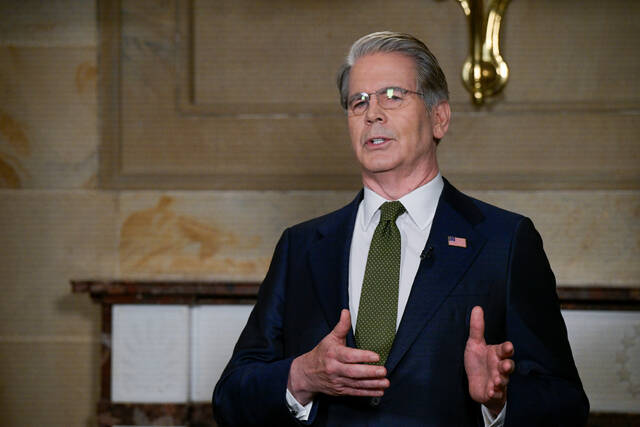The Trump administration has sent new guidelines to U.S. asylum officers, directing them to take a more skeptical and confrontational approach during interviews with migrants seeking refuge. It is the latest measure aimed at tightening the nation’s legal “loopholes” Homeland Security officials blame for a spike in border crossings.
According to internal documents and staff emails obtained Tuesday by The Washington Post, the asylum officers will more aggressively challenge applicants whose assertions of persecution contain discrepancies, and the officers will need to provide detailed justifications before concluding that an applicant has a well-founded fear of harm if deported to their home country.
The changes require officers to zero in on any gaps between what migrants say to U.S. border agents after they are taken into custody and testimony they provide during the interview process with a trained asylum officer.
“Officers conducting credible fear interviews should also be addressing any more detailed inconsistencies between the applicant’s testimony during the credible fear interview and other testimony in sworn statement,” John Lafferty, the head of the asylum division at U.S. Citizenship and Immigration Services (CIS), wrote to staffers in an email, outlining the changes.
The new guidelines are among the most significant steps the administration has taken to limit access to the country for foreigners seeking asylum, whose right to apply for humanitarian protection is protected by U.S. law and rooted in post-World War II international treaties granting refuge to those fleeing persecution. The changes appear to signal that the administration wants to turn away asylum seekers earlier in the legal process, aiming to cut down on the number of applicants who enter the court system and to deter others from attempting to cross into the United States to seek asylum.
Officials with the CIS and the White House did not immediately respond to requests for comment on Tuesday afternoon.
With a record number of Central American families arriving at the border and inundating U.S. courts with asylum claims, Trump has repeatedly scoffed at the protections and has told crowds that dangerous criminals are using it to game the system and stay in the United States.
“The asylum program is a scam,” Trump said last month in a speech. “Some of the roughest people you’ve ever seen, people that look like they should be fighting for the UFC (Ultimate Fighting Championship) … you look at this guy you say ‘Wow, that’s a tough cookie!’ “
One asylum officer, who spoke on the condition of anonymity for fear of retribution, said the changes are “huge” and would make the screening process more time-consuming by requiring officers to provide detailed written analysis before referring an applicant to the courts.
Homeland Security agencies already are struggling to comply with court orders limiting the amount of time families with children can be held in detention, and further processing delays could exacerbate dangerous overcrowding at Border Patrol stations and immigration jails. Some areas along the border have been overwhelmed, at times seeing three times as many migrants as they have beds in detention facilities, leading many to be directly released into the United States after initial questioning.
Migrants taken into custody at the border who convey a fear of persecution in their homelands typically receive a cursory interview with an asylum officer, and it is up to that officer to evaluate whether the person’s story is credible enough to be referred to immigration courts for a fuller assessment.
The initial screening is known as a “credible fear” assessment, and it has become a particular focus of frustration for the White House at a time when illegal border crossings have jumped to a 12-year high, exceeding 100,000 per month.
Statistics show most migrants who say they are persecuted pass the initial screening, but far fewer ultimately receive asylum from a judge. An avalanche of new applicants in recent years has contributed to a backlog of more than 860,000 cases in U.S. immigration courts, and it can take years for an asylum applicant to get a final answer in court.
That lag time has created a loophole in U.S. immigration enforcement, Homeland Security Department officials say, especially for applicants who arrive with children. They are typically released from custody and allowed to remain in the country while their cases are adjudicated. The process allows them to spend years living and working in the United States, regardless of whether their claims are ultimately found to be valid.
Senior Trump adviser Stephen Miller has led the push to tighten up the asylum system, and his frustration with the slow pace of change was at the heart of his recent attempt to oust Francis Cissna, the head of the CIS, according to three administration officials. Cissna kept his job after senior GOP senators came to his defense and urged Trump to keep him.
One senior DHS official said Miller and others in the administration are struggling against an asylum officer corps that doesn’t share its immigration goals and would rather refer an applicant to the courts than risk making the wrong choice in a rushed decision with life-or-death consequences.
The administration’s changes take effect immediately, and asylum officers will be trained in their application in coming weeks, according to the emails and CIS officials.
The overhaul follows a White House directive last week ordering Homeland Security and Justice Department officials to tighten asylum rules by limiting access to work permits for applicants and charging fees for the first time to migrants who arrive on U.S. soil seeking humanitarian protection.
Those changes also direct the Justice Department to complete processing of asylum claims within 180 days.
Lafferty also told staffers that 10 U.S. Border Patrol agents had volunteered to join a pilot program that will train them to conduct credible-fear screenings. As many as 50 agents will be trained in coming months, he said.
The plan has raised concerns from immigrant advocates who say agents should not be making such consequential decisions about credibility of migrants’ deportation fears and their eligibility for humanitarian refuge.
“Credible fear interviews involve the discussion of sensitive, difficult issues,” Julie Veroff, of the American Civil Liberties Union’s Immigrant Rights Project, wrote Monday, calling the plan “highly concerning.”
“Federal law thus requires that credible fear interviews be conducted in a ‘nonadversarial manner,’ ” Veroff wrote. “Credible fear interviews have always been conducted by professionals who specialize in asylum adjudication, not immigration enforcement.”








